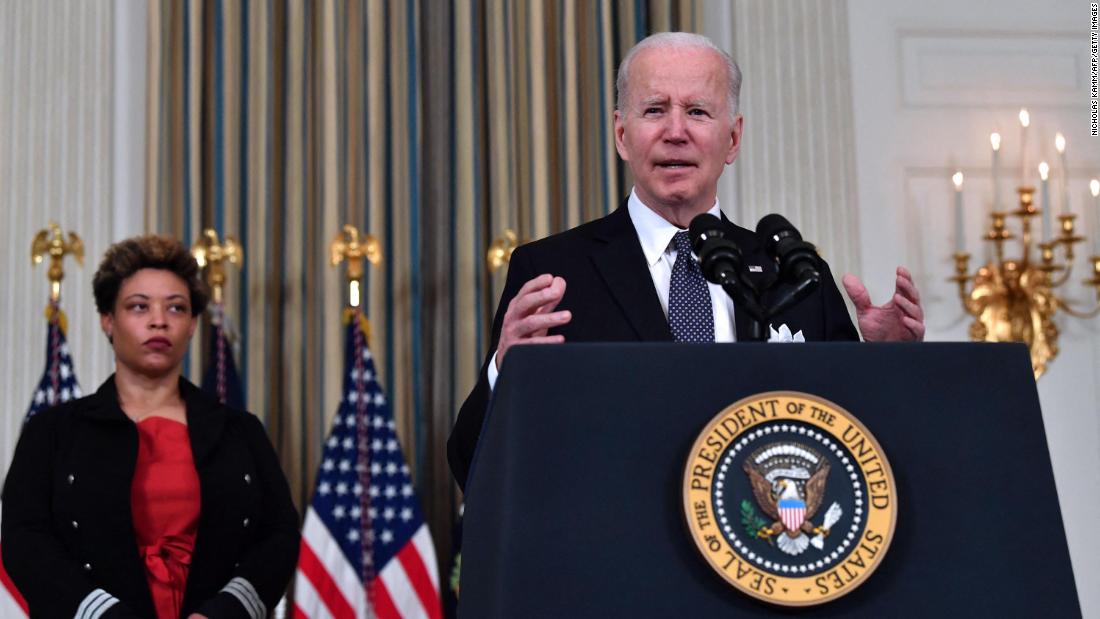President Joe Biden released his fiscal 2023 budget proposal on Monday, and while it includes increased funding for security and cuts the deficit, officials admit inflation could continue to cause problems for the broader economy.
At a White House event to announce the budget, Biden said the proposal is made up of three main elements: fiscal responsibility, safety and security, and investments to “build a better America.”
Biden sought to mark a shift in his administration’s approach to federal spending prior to the pandemic, singling out his predecessor, former President Donald Trump, for increasing the federal deficit throughout his time in office.
Biden said his proposed $1.3 trillion budget cut would be “the largest one-year deficit reduction in American history.”
Funds for Ukraine
As Russia’s invasion of Ukraine continues, the proposed budget includes $6.9 billion for the European Deterrence Initiative and NATO and to “counter Russian aggression in support of Ukraine.”
The president said his proposal “will be among the largest investments in our national security in history.”
The homeland security spending proposal has already drawn criticism from both sides of the aisle, including from Senate Minority Leader Mitch McConnell, who says Biden’s budget was “woefully short on defense spending,” and Sen. Vermont Bernie Sanders has argued that “we don’t need a massive defense budget increase” when the United States “is already spending more on the military than the next 11 countries combined.”
The president acknowledged the criticism, saying, “Some people don’t like the increase, but we’re in a different world today. America is more prosperous, more successful, and more just when it’s safer.”
The budget also provides $3.2 billion in “discretionary resources for state and local grants” for communities to hire more police officers, and another $30 billion in “mandatory resources to support law enforcement, crime prevention and intervention in community violence”.
It will also add $10 billion in new funding for election administration, which they say is needed to “strengthen American democracy” as it faces unprecedented threats. The money for state and local officials, if approved by Congress, would be spent over 10 years and is intended to “provide state and local election officials with a predictable stream of funding for critical capital investments and increased staffing.” and services”.
Biden also wants to increase the Justice Department’s civil rights budget by $101 million, for a new total of $367 million. These funds would support, among other things, efforts to protect the right to vote. Last year, the Justice Department sued GOP-ruled states like Texas and Georgia over voting rules and redistricting maps that allegedly discriminate against minorities.
Billionaires tax
The budget calls for a new “minimum billionaire tax,” which not only includes billionaires but applies to anyone whose fortune exceeds $100 million, ensuring that the top 0.01 percent of households wealthy pay at least “20 percent of their total income in federal income taxes.” It also increases the interest rate companies pay on their profits and contains “additional measures to ensure that multinationals operating in the United States cannot use tax havens to lower the global minimum tax,” the White House said.
Council of Economic Advisers President Cecilia Rouse told reporters that Biden’s policies will reduce the projected deficit in the current fiscal year 2022 to “$1.3 trillion less than fiscal year 2021, and we believe that the policies in this budget will further reduce the deficit by another trillion over the next decade. But much of that deficit reduction is due to the end of temporary American Rescue Plan programs.
— Marshall Cohen, Ted Barrett and Manu Raju contributed reporting.

